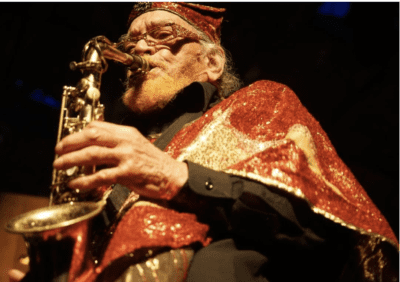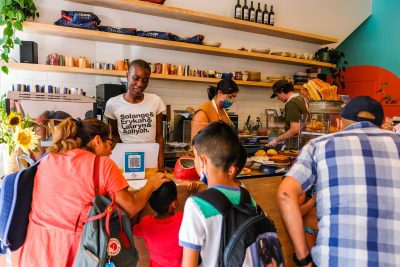From left: Pascale Armand, Alana Raquel Bowers, Kristin Dodson, Malika Samuel (Photo by Monique Carbon)
‘Bernarda’s Daughters’ confront the reality of gentrification
'To be a Haitian girl from Flatbush? Oh, I’m not to be messed with,' playwright Diane Exavier tells us
“Bernarda’s Daughters” begins on a blistering day in Flatbush. Audiences are immediately thrust into the close-knit dynamic between five Haitian sisters: Louise, Harriet, Lena, Maryse, and Adela — who all have wildly different personalities and outlooks on life. But when they are faced with the loss of their family home, they come together to combat the threat of displacement.
We often regard gentrification as a social issue of utmost priority in public settings, but when it touches our own neighborhoods, many opt to lose hope, or worse, ignore the reality of this crisis. The numbers speak for themselves, though. In the decade between 2010 and 2020 alone, Bed-Stuy lost 11,549 Black residents. It gained 18,186 white residents.
Haitian playwright, poet, educator, and lifelong Brooklynite, Diane Exavier, refuses to let this dilemma fall to the wayside of public discourse. In her work, which commonly explores the systems of organization that stratify the world as we know it, Exavier aims to reveal necessary truths as a means of reclaiming power. The cast in this most recent run of “Bernarda’s Daughters” included award-winning talent, Pascale Armand, Alana Raquel Bowers, Malika Samuel, Taji Senior, Tamara Tunie, and Kristin Dodson, who starred in another recent depiction of Brooklyn life: “Flatbush Misdemeanors.”
Though this is all brought to life upon a stage, the issues that Louise, Harriet, Lena, Maryse, and Adela face are undeniable — they are real. “Bernarda’s Daughters” held its final performance on June 4, but if you missed the off-Broadway show, you can listen to it anytime online.
Brooklyn Magazine attended the show, held at The Pershing Square Signature Center, in co-production with National Black Theatre, the longest-running Black theater in New York City, and spoke with Exavier as well as cast members when the curtains closed.
Your work is centered within the Caribbean diaspora; how has your own upbringing and heritage shaped your approach to the stories you tell?
Diane Exavier: My family is from Haiti — from a place in the southwest countryside called Jérémie, which funnily enough is known as the city of poets. There is an inherent song in the way we speak and communicate with each other, a call-and-response that has its own innate sense of rhythm and timing. I’m also from a family of matriarchs. Growing up around women who were working, managing households, and responsible for the care of children has always been a major point of focus in my questions about gender and power and how those dynamics get remixed in an American context. And, of course, there are all the smells, tastes, textures, and colors of the Caribbean — all things that I absolutely love playing around with in my work. In working on this play, I’ve realized that just as the work of Shakespeare has its own meter, so does the language of Flatbush, which is a slow stewing cauldron of the Caribbean.
What originally got you interested in dissecting these systems and their intersections with race and class?
Exavier: I am obsessed with understanding power, always paying attention to how it moves and what people are willing to do in order to get more of it. Growing up, we lived paycheck to paycheck. I was taught from a very early age that education was a currency and that working as hard as possible would result in the kind of financial success and security my family had immigrated to the United States for. As I got older and frequented more “elite” spaces — schools, organizations, and arts institutions — I realized that meritocracy is really a joke and that the structures maintaining the status quo are quite violent, insidious, and clever. I work to point out and ask questions about the intersections of race, class, gender, and even nationality because the uses — and really, misuses — of power all over the world are extraordinary.
You adapted “Bernarda’s Daughters” from García Lorca’s “The House of Bernarda Alba?”
Diane Exavier: Lorca’s “The House of Bernarda Alba” is such a classic play. I think sometimes people forget that Lorca was killed, essentially, for being a poet and for being queer. Totalitarian leaders are always deeply afraid of artists, but of poets in particular, because what poets do with language might actually be able to undo what dictators want to do with language. And fascists are certainly afraid of anyone who does not adhere to the status quo, which is always at the root of violence against queer people. And so, it was important for me to remember that about Lorca — not just the beauty of his plays and the countless productions and adaptations of his work in the decades since his assassination, but the ways in which he was dangerous to Franco’s regime in Spain, precisely because of his artistry and his identity. In writing a play inspired by “The House of Bernarda Alba,” I wanted to remind audiences of how poetry can stand up against powerful forces like patriarchy and gentrification, but also how poetry could shift our preconceived notions of what a play is supposed to be.
How has Brooklyn influenced your writing?
Exavier: I am Flatbush through and through! I grew up at Flatbush Junction at the crossing of Flatbush and Nostrand Avenues, the last stop on the 2/5 train and the convergence point of the B6, B11, Q35, B41, and B44. It’s a transportation hub. I’ve always carried that sense of coming home wherever I go, even when traveling. How can I understand the spaces I’m passing through as someone’s home? How can I imagine life anywhere, but especially in those places just outside of certain margins? And then there are, of course, all the ways in which being from Flatbush just makes me rude — direct, brash, unrelenting, severely clear-eyed. I love suddenly getting froggy and people not knowing what to do with that, let alone what “froggy” even means. And to be a Haitian girl from Flatbush? Oh, I’m not to be messed with.
What impact has gentrification had on you personally?
Taji Senior: I’m fairly new to Brooklyn and so I don’t have the same historical reference as other folks, but even in the short time that I’ve been here, I’ve been overwhelmed by the near-constant construction and building of new residences that I know the natives of this community will not be able to afford. I often wonder how long it will be before I can no longer afford to live here. During my first year in Bed-Stuy, I saw two businesses, one of them Black-owned, priced out and taken over by people from outside the community or left to sit vacant.
Malika Samuel: My family has roots in Harlem and my family’s business is currently in Brooklyn and has been for over two decades. Many of my ancestors passed away very young so I search for them through these neighborhoods. I used to quite literally feel them as I walked the streets, stood in front of the buildings, and sat in the parks or stoops I could identify in the old photos I had of them. Things don’t look the same anymore and they certainly do not feel the same. It is getting harder and harder to find them in these spaces. The cultural displacement that occurs because of gentrification is palpable and I mourn for the loss of identity, character, safety, and security in these neighborhoods. I notice the dissonance everywhere. I walk differently in those spaces now and something about it feels so unfair. Plays like “Bernarda’s Daughters” are actively attempting to preserve these spaces and honor the people and stories that have roots there, ensuring that they aren’t erased completely due to gentrification.
Kristin Dodson: As a native Brooklyn girl, I’ve painstakingly watched my neighborhoods change and push out people. I’ve lived all over Brooklyn, and the main reasons I’ve moved are due to not being able to afford the rent because of gentrification. So much so that I now live in Jersey City. My hope is one day to be able to afford to buy a property back in Brooklyn.
“Community” is a buzzword that has almost lost any meaning. What does “community” mean to you?
Senior: Community, to me, means shared resources, access, care, and knowledge. Simply put, it means, “If I got it, you got it.”
Samuel: Our playwright Diane Exavier spoke a lot about relation and care and that resonated for me deeply because that is what community is at its core. To me, it’s about a genuine connection to another. A connection that encourages and provides the space to be one’s most authentic truthful self. Community is one of the most caring things you can provide for another and find for yourself.
Dodson: The merging of people together with the willingness to support one another. Working together for the goodness of all. That word is filled with love and respect. The desire to cultivate together.
In what ways do you resonate with your character, and what parts were more difficult to portray?
Senior: Ha! I resonate so much with Adela’s frustration with the lack of control she feels regarding her circumstance. She can’t control or change or stop gentrification. She can’t singularly assuage patriarchy and what she and her sisters are relegated to as women. All she can do is find a way to manage the discomfort and push back against it when she can, and that’s real. Vulnerability is always difficult to play. The truth about Adela is that her theory has no practice and as much as she tries to distance herself from her family and her mother, she is still of them and that’s not easy to reckon with. It feels good and fun as an actor to slam dunk these self-righteous monologues, but how do you deal with the other characters holding up the truth of who Adela is? It’s a challenge for sure and I was grateful to accept it as best as I could.
Samuel: I admire Maryse. She approaches the world with no illusions and such a raw fearless wonder. I strive to disrupt expectations, traditions, and conventions the way she freely does. Maryse speaks very openly about her carnal desires and that was a little difficult to portray before I was able to get past my own uncomfortable giggles. She has that effect on people and I actually grew to love hearing the audience shift in their seats each night as she spoke.
Dodson: Both Lena and I are from Brooklyn and of Caribbean descent. I feel like we both choose to observe and can always be found listening. As she says, “Any silence is not silence!” It was difficult to portray someone who is the baby of the family! I’m the second oldest — the middle child. So I had to do my research by studying my younger sister, Kaylin, who reminds me so much of Lena. They love reality TV, know the most random of facts, and are dead set on living their life on their own terms. It was a beautiful experience to live in that being.
You might also like 


























